by Georgia Center for Opportunity | Oct 28, 2014
Visit Duke and UNC Chapel Hill on 11/23/14 – 11/24/14 with Breakthrough Ambassadors. The tour is open to parents and 10th – 12th grade high school students.
Check out this fantastic opportunity through Breakthrough Ambassadors to visit UNC Chapel Hill and Duke for an overnight stay! 10th, 11th, and 12th graders from any high school and parents are all invited – Come and join us. This is a chance that comes to very few, so take advantage of viewing two of the South’s best schools.
COST: $75/person (includes transportation & hotel)
WHEN: Sunday, November 23rd – Depart 7 a.m.
through Monday, November 24th (college visits & return home – around 10:00 p.m.)
HOW: 55 passenger Charter Bus
COLLEGES: Duke University & the University of North Carolina (UNC) Chapel Hill
Space is limited. First come, first served.
Any questions? Contact prhsbreakthrough@gmail.com
Register Now
by Georgia Center for Opportunity | Oct 14, 2014
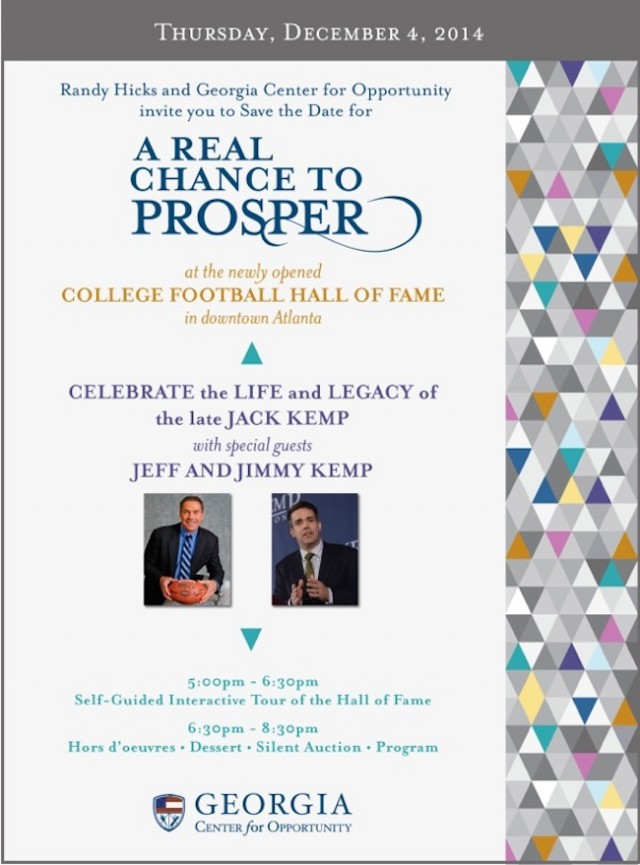
Join us at the College Football Hall of Fame on December 4, 2014
to celebrate the life and legacy of the late Jack Kemp.
Register to Attend
by Georgia Center for Opportunity | Oct 14, 2014
Junior Achievement (JA) of Georgia has created an interactive, marketplace environment where children’s dreams about future careers actually come to life. Set in the fictitious community of JA BizTown, students have the opportunity to experience a day-in-the-life of a working professional.
A Microcosm of Atlanta
Located in the Georgia World Congress Center, BizTown is an interactive community that serves as a microcosm of the Atlanta business community. Representing such businesses as Chick-Fil-A, AT&T, UPS, Bank of America, Wells Fargo, Delta, RockTenn Recycling, and the Atlanta Falcons, the space is masterfully designed with authentic store fronts, a central, artificial lawn, and a stage for the mayor and CEOs to give town speeches. The realistic design of the space and the energy of the students make the town feel like it has come to life.

Interactive Learning Environment
The purpose of BizTown is to create a learning environment where students have the opportunity to experience what it is like to be an employee, tax-payer, and consumer. Within their respective companies, students are given the responsibility of carrying out their job assignments for such positions as CEO, CFO, sales manager, and marketing director. They are expected to quickly learn these job responsibilities, become acclimated to their unique business environment, and contribute to the day-to-day operations of their company, effectively simulating a “first-day-on-the-job” experience.
However, students’ experience at BizTown is not the only time where they have had a chance to discuss what it is like being a part of the global economy. In fact, prior to arriving in this community, students complete three weeks of JA-provided coursework which interweaves concepts of practical economics, career awareness, and entrepreneurship.
Their time in BizTown serves as a culmination of their learning experience where they have a chance to put into practice what they have learned in a fun and interactive way.
In addition to teaching students to balance the demands of job assignments, this hands-on model makes learning basic financial literacy concepts fun. Within the span of four hours, students learn how to develop a personal budget, deposit a paycheck at the bank, and make purchasing decisions. Many of the middle school students for which BizTown is geared have likely never written a check or balanced a checkbook before participating in this program. Participating in this simulation gives them the chance to practice these skills among their classmates and see how they are necessary for becoming a responsible consumer.
Bridging the Business and Education Community
Business and community volunteers play a key role in making BizTown a success. They are responsible for overseeing the students in each of the businesses, ensuring that they know their work responsibilities and are able to carry them out.
While the students work, volunteers are able to share practical tips and life lessons which serve to make the learning experience even more powerful.
This interaction gives the volunteers a chance to give back to their community by preparing the next generation for both professional and personal success.
Personal Reflections
Several Georgia Center for Opportunity (GCO) team members recently had the privilege of spending a day volunteering at BizTown. Here’s what a few of them wrote in reflecting about their experience:
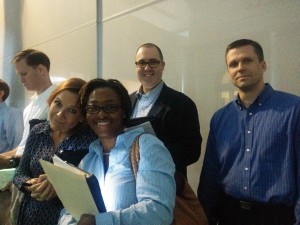
Aundrea Gregg – “I was not only impressed with the overall setup of Junior Achievement’s Biz Town, I was also blown away by the hard work and business sense of the students I had the pleasure of working with on my volunteer day. As I helped out at the Delta shop, it was endearing to watch students develop pricing and marketing strategies, practice customer service skills, and for the students who acted as the CEO and CFO, get a taste of managing employees and running a company.
Chris Elder – “The immersiveness of the JA BizTown environment combined with the fast-paced tasks really kept the kids focused on the simulation. The students I helped thoroughly embraced their roles and often found themselves needing to prioritize and make tradeoffs in how they should spend their time.
“It was great exposure to some very important non-academic skills.”
Michael Schulte – “Overseeing the students assigned to RockTenn Recycling, I observed the challenges of running the day-to-day operations of a business. Not only can the accounting become a nightmare if you don’t stay on top of it, but making sure the employees are doing their tasks (and are equipped for their job) is a major challenge…This program wonderfully simulates a ‘real work’ experience.”
Katherine Greene – “I had the pleasure of coaching a group of sixth graders as they ran the operations of a Chick-Fil-A restaurant…In the real world, these students may not have been old enough to work, vote, or be the boss, but they were learning how to manage a restaurant, write checks, deposit checks, have staff meetings, pay bills, earn money, purchase goods, and even vote for a mayor. I commend JA Biztown for helping the students to experience the hustle and bustle of a real community.”
A Shared Vision
The investment that JA is making in students’ lives to prepare them for future success is commendable. Its strategy of involving local business and community volunteers to achieve this goal aligns well with the work GCO is doing within our Breakthrough Norcross Initiative. Both JA and GCO desire to see students dream big and reach their full potential, and we know that this is only possible as members in the community see it as their responsibility to help make this happen.
In addition, Aundrea Gregg found a common thread between the work she is doing with GCO and the work JA is doing with students at BizTown. Listen to her words as she describes the potential that this program has in continuing to shape future leaders in our state:
“After the first business period, one of the flight attendants said, ‘Is this what your day is like? Being an adult is so much work!’ By the second business period, however, everyone seemed to have found their groove and the same young lady said ‘Eh, it’s not so bad after all!’
“The ‘light bulb moments’ that I witnessed were exactly what made the day so special.”
“Thinking on my work for the College and Career Pathways initiative, it is also those light bulb moments that drive home the importance of bridging in-classroom learning with hands-on practice in real-life scenarios. I am excited for all the knowledge the students gained at BizTown, and that this program may soon reach many more students across the state.”
A BizTown program is slated to open up in Gwinnett sometime soon.
Image Credit: Atlanta Public Schools (featured image) and Junior Achievement of Georgia
by Georgia Center for Opportunity | Oct 10, 2014

Walking into a polling booth and thinking, “Who is this guy??” could be the scariest thing you do this fall. With major state and national seats on the line, thoroughly researching candidates and their platform is a vital first step in selecting effective leadership this November. As Midterm Elections are almost upon us, now is the time to get to know the people who will potentially represent you, your family, and your community.
Why be an informed voter?
For starters, unaware citizens make for a good laugh on Jimmy Kimmel skits. Seriously though, ill informed voters do little to change the conversation on topics that matter the most in local communities. For education, in particular, the upcoming election–by way of the Governor’s and State School Superintendent race–will determine who rolls out new reform strategies to improve outcomes for students across the state. Likewise, Georgia’s US Senate race will have a tremendous impact on which party controls the House and Senate.
Investigating beyond sponsored television ads and news clippings can boost the power of your vote this election day.
3 Ways to Get to Know Midterm Election Candidates
- Visit candidate websites: Starting with a visit to candidates’ campaign website is a quick and easy way to familiarize oneself with the respective platforms. Creating a checklist of issues that matter to you will expedite the process of comparing and prioritizing candidates according to their stance.
- Check voting records: Beyond what candidates say, it is important to research how they support the issues you care about. Particularly for incumbents, checking sites such as Govtrack.us will clarify candidates’ legislative voting record. Additionally, it may be beneficial to search for initiatives that candidates are leading independently.
- Attend local debates/community events: Engaging political hopefuls directly and in-person is an invaluable opportunity for informed voters. If possible, make it a priority attend community events where candidates will be in attendance. Also, be sure to attend or watch upcoming debates.
Whether turningout for issues impacting local communities, the state, or the nation, taking the time to know the candidates and where they stand is the responsibility of each voter. With the use of the tips above, make your vote count on November 4th.
by Eric Cochling | Oct 2, 2014

Imagine taking schools performing in the bottom 5 percent of all schools in a district, where reading proficiency is 22 percent and math proficiency is less than 3 percent (no, that’s not a typo!), and doubling and tripling those numbers in just two years time.
That would be an amazing accomplishment measured by any standard.
Well, despite sounding impossible, these are the results that Matchbook Learning has achieved in one of the toughest places in the country – Detroit.
And you don’t have to take my word for it.
Sajan George, Founder and CEO of Matchbook Learning will be our guest speaker at our October 16th innovation luncheon. George will be discussing Matchbook’s work in Detroit and how the right use of technology, coupled with creative ways to empower and inspire students and teachers, can set the stage for dramatic turnarounds for failing schools and, more importantly, greater success for students.
Please join us.
Register to Attend
by Georgia Center for Opportunity | Sep 12, 2014
Meeting people “where they are” is foundational to Georgia Center for Opportunity’s (GCO) mission to serve the community and remove barriers to opportunity. As part of this mission, GCO team members recently participated in a unique weekend retreat at City of Refuge (COR), one of Atlanta’s largest homeless shelters for women and children. While this experience was an excellent platform for team bonding, the team also gained life-changing lessons from the residents of COR.
DAY 1
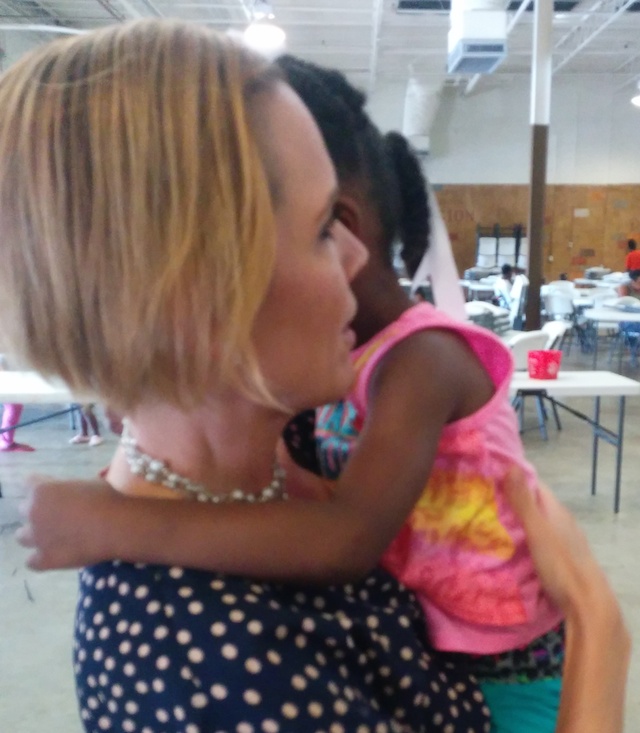
Linda Newton holds new friend at City of Refuge. Courtesy, @GAOpportunity
While many programs provide meals and clothing to the homeless, very few provide the opportunity to connect deeply with those being served. GCO’s retreat was graciously hosted by one such organization, Restoration ATL (RATL), a non-profit dedicated to creating urban ministry environments that foster healing. RATL’s director and weekend guide, Pastor Jim Ellison, emphasized with great passion that volunteers were there to simply “be with” the ladies and children to get to know them better.
Assimilating into life at the shelter was eased immediately by the children. Delivery Manager, Linda Newton, reflects on her initial moments at COR:
My first experience that weekend was with a 3-year old girl. She blind-sided me, running up to me from behind and immediately holding her arms up to me as if we were long-lost friends. I picked her up and she wrapped her arms and legs around me tight. She was absolutely a love, and we became fast friends.
As the children ushered in the team, dinner time provided opportunities to learn about the women of COR and the circumstances that led them to the shelter. While some women were more open than others, the stories and fellowship that flowed across the dinner table further broke the ice between volunteers and residents.
I had the pleasure of eating dinner with a woman named Liz. She shared with me that a house fire displaced her months earlier. This is a situation that could impact anyone! Throughout our encounter, Liz expressed great determination to rebuild her life and provide a future for her one month old son, who had actually been born during her time at City of Refuge. As I held Liz’s son and listened to her, I realized how much like a family member she was. This meaningful meal brought me a new perspective on what homelessness means in Atlanta.

Holding Liz’s son at dinner. Courtesy, @GAOpportunity
Stories of misfortune were common-place amongst the women, with job loss, mental illness, and domestic violence being just a few of the tragedies impacting their lives. Facing tough paths back to self-sufficiency, events such as the ice cream social–which followed dinner– served as small moments of enjoyment for the women and children alike.
Vice President of Operations, Chris Elder shares his thoughts on the ice cream social:
At the Friday night ice cream social, I had a difficult time discerning who was a resident and who was a volunteer. The women and the kids staying at City of Refuge looked just like the women and kids I see around Norcross. Some of the moms and older kids were even on their phones texting, checking Facebook, and playing games, a scene not unfamiliar in my house. The younger kids played hard and laughed like they were anywhere else but in a homeless shelter. I was left with a restored hope in the pure resiliency of children.
DAY 2
Saturday brought deeper connections with acquaintances made just the day before, as well as enlightenment about the spiritual and emotional needs of those restoring their lives. The women’s morning group incorporated lively discussions about God’s love and building community.
Events Specialist, Katherine Greene writes:
I realized that all of us need community no matter where we live. These women did not choose to be homeless but even in their homelessness there is a strong need for community. Words like love, hope, forgiveness, and togetherness came up as we described a healthy community. It was great discovering things that we had in common. This helped us to learn more about each other and to find a connection to help us bond even more.
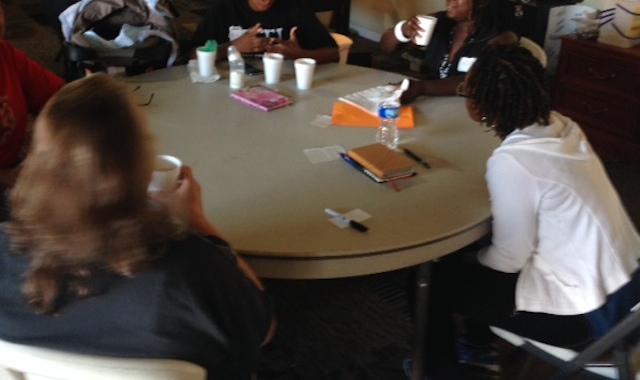
Katherine Greene enjoys women’s morning group. Courtesy, Restoration ATL
Planting vegetables in the community garden later in the afternoon further drove home the importance of community and the harvest that can come from working together. Through expressing feelings and getting hands dirty, personal barriers dissolved into understanding and warm smiles.
GCO team members also participated in a morning full of activities such as kick-ball and arts-and-crafts with the children of the shelter. While fun in nature, free time also revealed some of the hard effects of living in a shelter and family breakdown.
Breakthrough Fellow Michael Schulte writes:
Interacting with the kids reinforced several important lessons for me: Children are eager for attention and affection, they are incredibly adaptable to their surroundings, and they are significantly shaped by those who raise them. While playing with the children brought me a lot of joy, it also carried the sober reminder that a number of these kids come from abusive backgrounds. I saw this in a 12-year-old boy who verbally threatened and intimidated his peers every time they made him angry. I am hopeful that City of Refuge will foster healing for a number of these kids and rebuild trust within relationships they have.
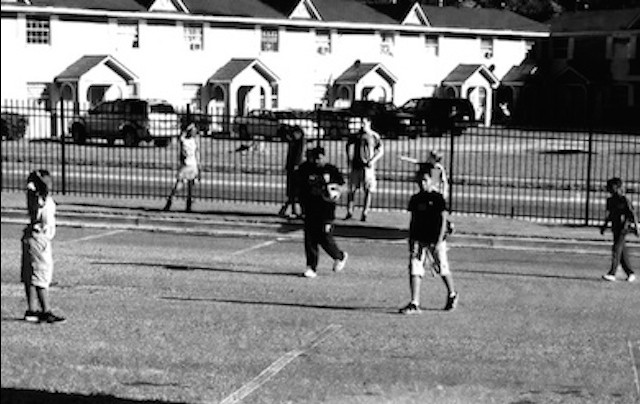
Michael Schulte leads recreational activities at City of Refuge. Courtesy Restoration ATL
Experiencing both highs and lows at City of Refuge, it was clear by the end of the second day that no one was quite the same as when they arrived. There was an overwhelming sense of honor for having shared time in the lives of so many dynamic, insightful, inspiring, and tough individuals. Team members also found themselves humbled.
Elder writes:
It certainly put the trivialities of my life that I consider problems into perspective, and clearly illustrated how slippery the social mobility ladder can be for any of us.
Greene writes:
I reflected back on some of my life’s most difficult circumstances and realized that these women were all teachers without even realizing it. They were teaching me (the student) how to listen to people and how to be grateful in everything.

Restoration ATL’s mission scripture. Courtesy, @GAOpportunity
The experience at City of Refuge and participation in Restoration ATL’s weekend retreat is one that will not soon be forgotten by the GCO team.
Newton writes:
My last experience at City of Refuge was with a former resident who had come back to volunteer with RATL. She and I spoke quite a bit through the course of the weekend and I learned that she was a recovering drug addict and alcoholic, only about 3 years older than me. She had a great spirit and sense of humor and I really enjoyed talking with her. We have since communicated by text, and I hope to stay in touch with her. I fear that she will relapse, as she has many times in the past. I want to continue to encourage her and hope to be a positive influence in her life. I really want her to make it.
The residents of the shelter represent only a small group of Georgia’s 27,000 homeless men, women, and children. Taking the time to view Georgia’s homeless as the friends, loved ones, neighbors, employees, co-workers, and students that they are is vital to enacting meaningful interventions that will change lives.
For more information on City of Refuge, Restoration ATL, and Georgia Center for Opportunity‘s work, please follow the links.









